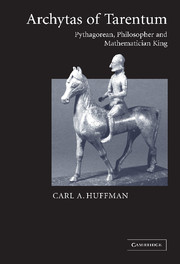Book contents
- Frontmatter
- Contents
- List of figures
- Preface
- PART ONE INTRODUCTORY ESSAYS
- I Life, writings and reception
- II The philosophy of Archytas
- III The authenticity question
- PART TWO GENUINE FRAGMENTS
- PART THREE GENUINE TESTIMONIA
- Appendix 1 Spurious writings and testimonia
- Appendix 2 Archytas' name
- Bibliography
- Select index of Greek words and phrases
- Index locorum
- General index
II - The philosophy of Archytas
Published online by Cambridge University Press: 04 August 2010
- Frontmatter
- Contents
- List of figures
- Preface
- PART ONE INTRODUCTORY ESSAYS
- I Life, writings and reception
- II The philosophy of Archytas
- III The authenticity question
- PART TWO GENUINE FRAGMENTS
- PART THREE GENUINE TESTIMONIA
- Appendix 1 Spurious writings and testimonia
- Appendix 2 Archytas' name
- Bibliography
- Select index of Greek words and phrases
- Index locorum
- General index
Summary
Archytas of Tarentum fits the popular conception of a Pythagorean better than anyone in the Pythagorean tradition, including Pythagoras himself. He was a distinguished mathematician; indeed we know of no other Pythagorean who even approached the mathematical prowess, which Archytas displays in his stunning solution to the problem of doubling the cube, the so-called Delian problem (A14). He also showed the typical Pythagorean interest in the mathematics of music, but again his analysis of the music of his day is by far the most sophisticated piece of harmonic theory in the early Pythagorean tradition (A16). Finally, he was elected leader of his city-state, Tarentum, seven consecutive times and his accomplishments in the political sphere are more impressive and better documented than those in the legends about Pythagoras (see “Life, writings and reception” above). Thus, we have the Pythagorean whom some have seen as the model for Plato's philosopher king (Guthrie 1962: 333). It is true, nonetheless, that Archytas has received relatively little attention from scholars of the history of ancient philosophy, let alone the educated community as a whole. He might justly be labeled “the lost Pythagorean.” Pythagoras has, of course, garnered the most attention, in large part because of his enormous importance in later antiquity (see, e.g., O'Meara 1989). The legend of Pythagoras has recently been debunked to some extent, and a more accurate appreciation of his accomplishment has been achieved (Burkert 1972a, Huffman 1999a: 66–75).
- Type
- Chapter
- Information
- Archytas of TarentumPythagorean, Philosopher and Mathematician King, pp. 44 - 90Publisher: Cambridge University PressPrint publication year: 2005



